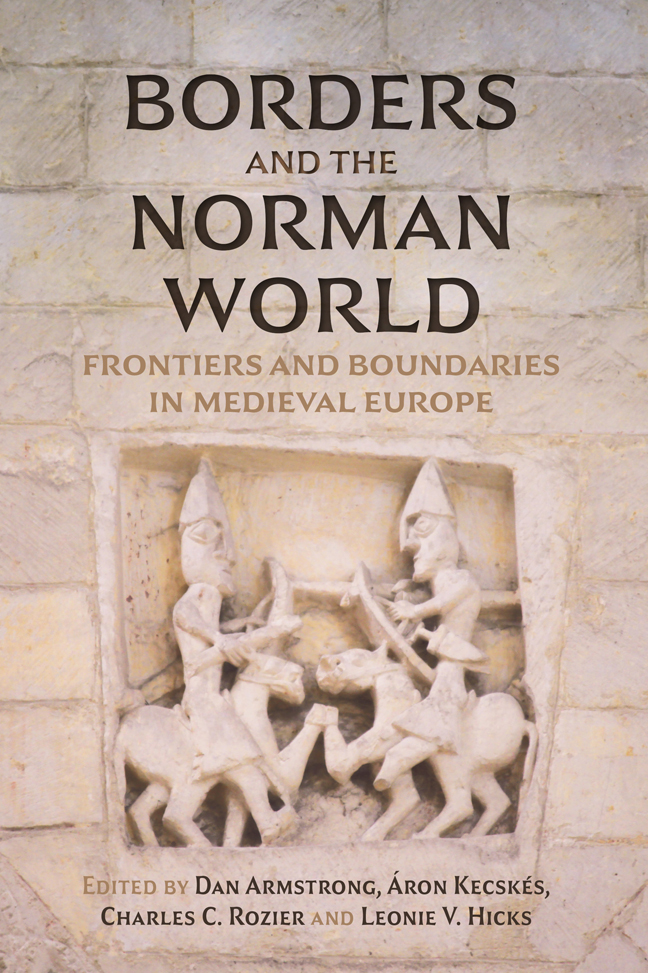Book contents
- Frontmatter
- Contents
- List of Illustrations
- List of Contributors
- Acknowledgements
- List of Abbreviations
- Naming Conventions
- Maps
- Introduction: Writing the Borders of the Norman World
- Part I Borders in and Around the Norman World
- Part II Ecclesiastical Borders
- Part III Conceptual Boundaries
- Afterword: Borders, Landscapes, and Seascapes
- Select Bibliography
- Index
8 - Temporal and Spiritual Power in Norman Sicily: An Unreal Border?
Published online by Cambridge University Press: 22 February 2024
- Frontmatter
- Contents
- List of Illustrations
- List of Contributors
- Acknowledgements
- List of Abbreviations
- Naming Conventions
- Maps
- Introduction: Writing the Borders of the Norman World
- Part I Borders in and Around the Norman World
- Part II Ecclesiastical Borders
- Part III Conceptual Boundaries
- Afterword: Borders, Landscapes, and Seascapes
- Select Bibliography
- Index
Summary
The Relations Between The Normans and the papacy comprise an important part of the political history of the Norman government of Sicily (1061–1194). This history has been the subject of extensive and wide-ranging studies. The present chapter seeks to add to these studies of the relationship by investigating how the popes and the Normans tried to exercise control over the ecclesiastical affairs of the Sicilian Church. The aim is to understand whether the Norman rulers exercised both temporal and spiritual power in their government of the island or whether it is possible to trace a boundary – a border – between the spheres of Regnum and Sacerdotium.
As we shall see, Norman rulers imposed tight control over the local church, raising a conflict of jurisdictions with the papacy which was balanced through reciprocal agreements and concessions. For this reason, we will address the limits of papal jurisdiction over the Sicilian Church, showing how this border was constructed and negotiated.
Shedding light on this point is essential since the historiography on the subject has long been influenced by an intense legal-historical debate, which lasted from the sixteenth to the nineteenth century, on the alleged status of the apostolic legation attributed by the pope to the Norman rulers of Sicily. According to some interpretations of this legation, temporal power and spiritual power would have been concentrated in the hands of the king so that it would not be possible to speak of any boundary between the two spheres of jurisdiction. However, the sources do not seem to confirm this interpretation and prove that the Norman rulers, even though they controlled the local church, were not papal legates.
The Borders of the Latin West: The Conquest of Sicily
Since Late Antiquity, the bishop of Rome had exercised authority over Sicily in his capacity as western patriarch, metropolitan, and holder of the Patrimonium Sancti Petri (lands historically privately owned by the Church of Rome). The popes made use of agents, apostolic vicars and rectors, who were sent to the island and tasked with controlling and directing the local Church. The papal rights and properties on Sicily, however, were lost in the eighth century as a result of the Iconoclastic Schism, which brought the island under the jurisdiction of the Patriarchate of Constantinople. Papal interventions ceased altogether during the Muslim rule of the island (827–1091).
- Type
- Chapter
- Information
- Borders and the Norman WorldFrontiers and Boundaries in Medieval Europe, pp. 201 - 214Publisher: Boydell & BrewerPrint publication year: 2023



